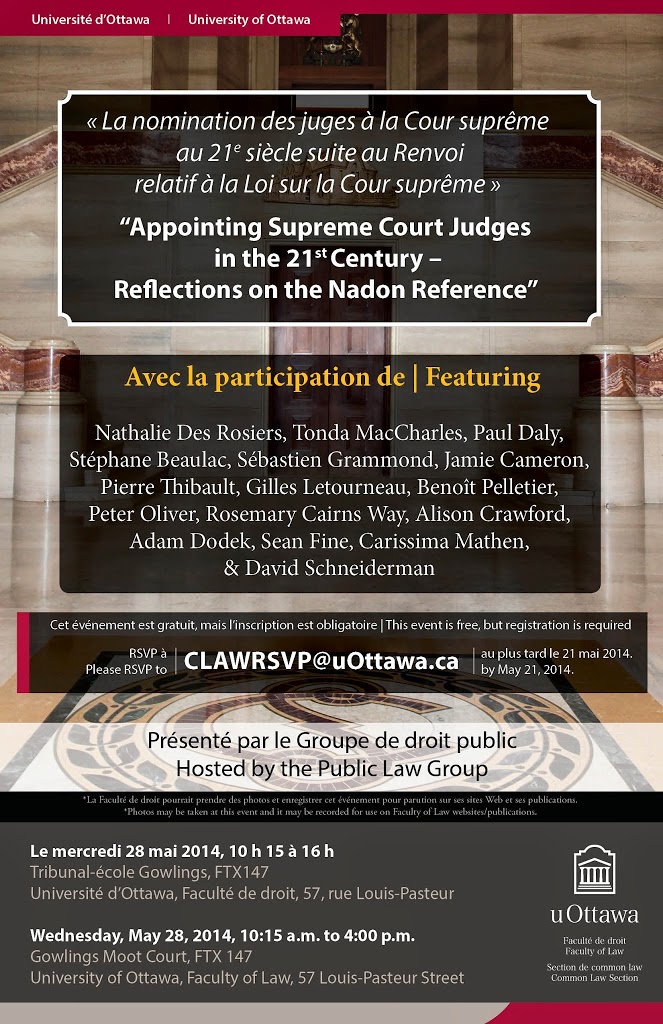2014
Events From Blogger
Symposium on the Nadon Reference: May 28, University of Ottawa
I have been organizing this event with Carissima Mathen from Ottawa. We have a stellar line-up of guests to analyze the decision and its consequences. I look forward to seeing you there! Read more
From Blogger
A New Blog on Administrative Justice
I previously mentioned Unjust by Design, an excellent book on administrative justice by Ron Ellis. The book was recently shortlisted for the prestigious Donner Prize. Ron now has a website and blog, Administrative Justice Reform, on which he discusses various aspects of administrative justice. His recent series of posts on the restructuring of federal tribunals […] Read more
From Blogger
Sunstein on Breyer on Reasoned Decision-making
Cass Sunstein has a nice short essay on Justice Breyer in a forthcoming issue of the Harvard Law Review, “From Technocrat to Democrat“: There is an epistemic argument for judicial deference to the decisions of administrative agencies and legislatures: courts do not have easy access to relevant information, and they should defer to those who […] Read more
From Blogger
Three Strange Things about Martin v. Alberta (Workers’ Compensation Board), 2014 SCC 25
Martin v. Alberta (Workers’ Compensation Board), 2014 SCC 25 does little or nothing in the way of doctrinal development, and so should not be expected to have a lasting impact on the law. Three aspects of this Supreme Court of Canada decision are nonetheless worth highlighting in an effort to explain why Martin is best […] Read more
From Blogger
Who Decides Here? Deference on Ministerial Interpretations of Law (Again)
I was rather optimistic in thinking that the question of deference to ministerial interpretations of law had been settled by the Supreme Court of Canada in Agraira (see my post here). Two stern responses arrived last week from the Federal Court of Appeal, the body which deals more than any other with judicial review of […] Read more
From Blogger
Breaking Out of Federal Court: Mission Institution v. Khela, 2014 SCC 24
Under the Federal Courts Act, the Federal Court has exclusive jurisdiction to issue an injunction, writ of certiorari, writ of prohibition, writ of mandamus or writ of quo warranto, or grant declaratory relief, against any federal board, commission or other tribunal. A notable absentee from this list is the writ of habeas corpus. Since its […] Read more
From Blogger
Judicial Review of Administrative Action is Always Interesting: Kennedy v. The Charity Commissioner 2014 UKSC 20
Towards the beginning of his classic essay “The Core of the Case against Judicial Review“, Jeremy Waldron notes that his argument is not directed against review of executive action, that is, most of what we conventionally call administrative law. The exclusion has always struck me as strange. Waldron’s argument is that courts are ill-suited relative […] Read more
From Blogger
Opening Closed Doors: Fédération autonome de l’enseignement c. Commission scolaire de Laval, 2014 QCCA 591
A background check on a teacher reveals criminal history. He is fired by the elected members of the local school board after a meeting held behind closed doors. He contests the decision and seeks to question three of the commissioners before an arbitrator. They refuse, citing privilege. Unsuccessfully, as it turns out: Fédération autonome de […] Read more
From Blogger
The “Range” of Reasonable Outcomes: a Spectrum or an Accordion?
My post welcoming Evans J.A.’s recent suggestion that weight could be accorded to administrative determinations of procedural fairness questions has provoked some debate, some in the comments section of that post, some on Twitter and some in emails to me. Another Federal Court of Appeal decision is therefore timely: Canada (Transport, Infrastructure and Communities) v. […] Read more
From Blogger
Move Along, Nothing to See Here: Orthodoxy and Procedural Fairness
A vigorous debate erupted in the comments to a recent post on deference on questions of procedural fairness. Recently, doctrinal orthodoxy has been challenged by several Canadian judges (a challenge based on Canadian developments but which ought also to be on the radar of those overseas) who have contended that procedural questions can no longer […] Read more
